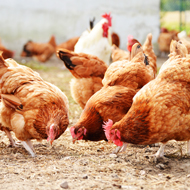Genes may give greater resistance to avian flu

Genes play a key role in whether or not chickens contract avian influenza.
Genes may give some chickens greater resistance to avian flu, according to research by The Pirbright Institute.
Findings described in the journal Scientific Reports reveal that genes play a key role in whether or not chickens contract the virus.
Researchers believe that the discovery could aid the understanding of avian influenza and how it transmits amongst birds.
Study author, Dr Colin Butter, explains: “Our results are valuable in emphasising the important role a ‘host’ plays in the spread of avian flu, and also in highlighting a number of factors relating to the chain of infection and control mechanisms which are affected by the route of infection.”
In the study, researchers assessed two genetically distinct lines of chickens to find out if genetics played a part in the susceptibility or resistance to infection.
They discovered that chickens that carried the virus, but were genetically resistant to the disease, only shed the virus through their respiratory tract, and for a limited amount of time.
Chickens that were susceptible to the disease, however, also shed the virus in faeces and over a longer period of time.
The researchers found that this was the only relevant means of spreading the virus. Therefore resistant birds were not able to initiate or sustain the chain of transmission.
Later results from the study indicate that this could be caused by a genetic restriction within the chicken, which stops the virus spreading inside the body.
The team are now planning further work to discover and examine the precise biological mechanisms behind the genetic resistance.



 The veterinary mental health charity Vetlife is inviting the veterinary community to join it for a sponsored cold-water dip.
The veterinary mental health charity Vetlife is inviting the veterinary community to join it for a sponsored cold-water dip.